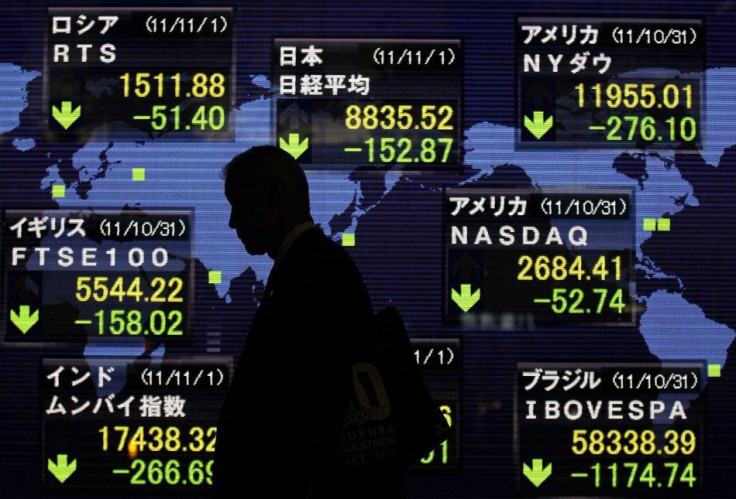Asia Markets Close Mixed Thursday, With Some Bargain Hunting

(Reuters) - Japan's benchmark Nikkei slipped on Thursday ahead of an Italian debt sale that could prove challenging in thin volumes, while the euro's tumble against the yen to a 10-year low pressured exporters.
Elpida Memory, Japan's last remaining player in the dynamic random-access memory chip market, sank as much as 10 percent after a report said it may delay paying back 30 billion yen ($385 million) in public funds.
The chipmaker underperformed the Nikkei average, which fell 0.3 percent to 8,398.89, taking cues from declines in U.S. and European shares as well as a broad fall in the euro on renewed concerns over the euro zone sovereign debt crisis.
The broader Topix reversed earlier losses and gained 0.1 percent to 722.12.
The sale of 8.5 billion euros of Italian bonds later in the day was in focus, as market players looked to see the outcome of Rome's first long-term debt sale since the European Central Bank offered cut-price loans to entice banks to buy debts of struggling euro zone governments.
If there is any drama from (the Italian bond sale), obviously the U.S. market will fall and it's possible for the Nikkei to fall even further tomorrow, said Hiroyuki Fukunaga, CEO of Investrust.
Yutaka Miura, senior technical analyst at Mizuho Securities, said traders were unloading their risk positions ahead of the bond sale.
The euro hit a one-year low of $1.2887 and a 10-year trough against the yen on Thursday.
Japanese exporters with substantial exposure to Europe came under pressure. Canon Inc dropped 0.4 percent and industrial robot maker Fanuc lost 0.5 percent. Sony erased earlier losses and ended up 0.1 percent.
Financial shares were steady, supported by buying from investment trust funds also known as Toshin funds, traders said.
Japan's banking subindex edged up 0.4 percent.
Hajime Nakajima, a sales trader at Cosmo Securities in Osaka, said the Nikkei was likely to end the year at around
8,300.
Everyone is holding onto their cash and people are not willing to invest in risk assets. With this kind of market sentiment, there's nowhere for the cash to go, he said. Volume on Tokyo's main board remained thin, with 973 million shares changing hands, edging up from Tuesday's 807.2 million shares -- its lowest level in seven years.
The benchmark stayed trapped between two technical levels, struggling to top the 25-day moving average around 8,468 but held above 8,363 -- the 61.8 percent retracement of its rally from late November to early December.
For next year, market participants recommended sectors such as infrastructure, home building and building materials, citing expected reconstruction demand after the March earthquake and tsunami.
The Topix construction subindex is down 1.7 percent this year, faring better than the broader Topix and the Nikkei, which have fallen 20 and 17.9 percent respectively.
Despite this year's better performance, the construction sector had a 12-month forward price-to-earnings ratio of 11.6, only slightly more expensive than the Topix's 11.4.
Meanwhile, most other Southeast Asian bourses edged higher on Thursday, helped by late bargain-hunting in big caps and dividend-yielding stocks such as banks and telecoms, but trade remained quiet, especially ahead of an Italian debt auction that kept investors nervous.
The region's markets have been range-bound this week, with holidays keeping investors away and the euro zone debt crisis still clouding the global economic outlook.
It's too early to say that the worst of the European crisis is over. So investors preferred defensive plays rather than betting on recovery, said Pichai Lertsupongkij, head of investment advisory services for Thanachart Securities in Bangkok.
Philippine shares rose 0.8 percent on their last trading day of the year, racking up an annual gain of 4.1 percent, Asia's best performance, helped by the resilience of Manila's resources sector and a favourable outlook for telecoms firms.
Top miner Philex Mining Corp surged by nearly 50 percent on the year, the best-performing stock, and Globe Telecom Inc, the second-biggest telecommunications firm, jumped 35 percent. It added nearly 5 percent on Thursday.
Manila-based Gregg Llag, an analyst at AB Capital Securities Inc, attributed the rise on Thursday to year-end window dressing of investment portfolios but said the outlook for the local economy was also supportive.
Investors are optimistic about the resilience of the Philippine economy and the mining sector because of the country's large mineral resources. Telecoms was also another good story for its outlook and dividend returns, he said.
The Philippine bourse is shut on Friday and reopens on Monday, when other regional markets are closed.
Malaysian shares inched up 0.17 percent to their highest in more than four months after registering small gains over the past five sessions. Singapore's main index edged up 0.2 percent, after an early fall to a one-week low.
Indonesian stocks climbed 1.1 percent, sliding to a two-week low at one point. Jarkarta is up 2.8 percent on the year, the second-biggest gainer in Asia after Manila.
Vietnamese stocks ended flat, hovering around their lowest in almost three years.
Thai stocks extended their drop into a sixth session, hitting two-week lows. A raft of domestic selling, led by retail investors and domestic institutions, outweighed buying by foreign investors this month, the Thai bourse said.
Late buying sent top lender Bangkok Bank Pcl 0.7 percent higher at one point while telecoms firm Total Access Communication Pcl plunged 20.5 percent to a two-month low as it traded ex dividend. It hit a record high this month after announcing a big dividend.
Singaporean electric equipment maker SMB United Ltd. surged 9.6 percent after a takeover bid by Japan's Osaki Electric Co.
Asian stocks in general slipped on Thursday, tracking weakness in the U.S. and European share markets. The MSCI ex-Japan Asia Pacific index had shed 0.3 percent by 0930 GMT.
(Additional reporting by Viparat Jantraprap and by the Singapore bureau.)
--
© Copyright Thomson Reuters 2024. All rights reserved.





















